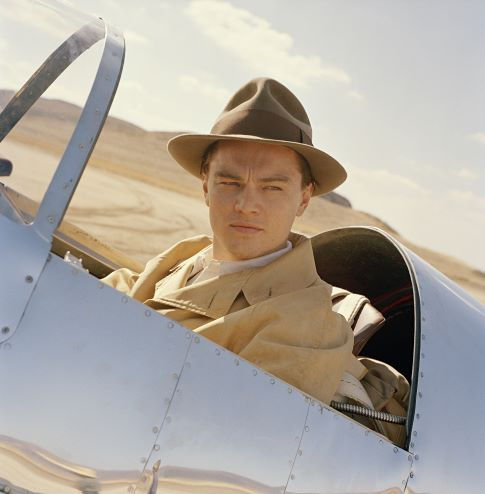The Aviator
I saw Martin Scorsese’s new movie about the life of Howard Hughes, The Aviator, on Sunday.

Leonardo DiCaprio as Howard Hughes in Martin Scorsese’s The Aviator
Image (c)2004, Miramax Pictures
This picture is a masterpiece. It is easily Scorsese’s strongest work in years. I was moved by his last picture, Gangs of New York, but I could recognize even when I first saw it why a lot of people weren’t — the last third of the film had a rushed, choppy feeling as the story lurched suddenly from the small-scale gang story Scorsese had been telling into the much larger story of the 1863 New York draft riots. For those of us who knew the history, it wasn’t too hard to follow the leap (the gangsters were Irish, and it was Irish immigrants angry at being pressed into the Union army who launched the riots), but that’s not many people these days, alas. The film was great, but it was hard not to wonder how much greater it could have been had it not been cut the way it had.
The Aviator leaves the viewer with no such what-ifs: it tells its tale confidently, and though it is a long movie it never slows its pace or seems to drag. Everything fits together perfectly.
It helps that Scorsese has chosen such a compelling subject. Most people only know Howard Hughes from the last years of his life, after his descent into madness left him an eccentric hermit; but in his youth he was a genuine innovator and pioneer in several very different fields (aircraft design, commercial air transport, and the movies), pulling himself to success in each mostly through obsessive attention to detail and sheer force of will. These same forces would eventually overwhelm his sanity, but while he managed to stay on the tiger, he accomplished some amazing things.
DiCaprio’s portrayal of Hughes is very strong. He hits all the right notes; watch the scene near the end where he pulls himself out of a prolonged obsessive fit to fight off an effort by rival tycoon Juan Trippe (the owner of Pan American Airlines, which at the time was the only airline to fly internationally from the U.S.) to buy out Hughes’ TWA, and you’ll see what I mean. You can sense the effort it must have taken Hughes to rally for that effort. DiCaprio’s performance is the latest evidence of his emergence as a serious actor (and, apparently, one of Scorsese’s go-to collaborators, much like Robert de Niro used to be).
The Aviator is Scorsese’s Citizen Kane — the story of a brilliant, driven man brought low in the end by his own weakness. It is full of great moments (the scene where Hughes becomes the “fastest man alive” in his experimental aircraft is so full of joy, it will make you want to get a pilot’s license — and another scene later on will make you think again). You should see it.
